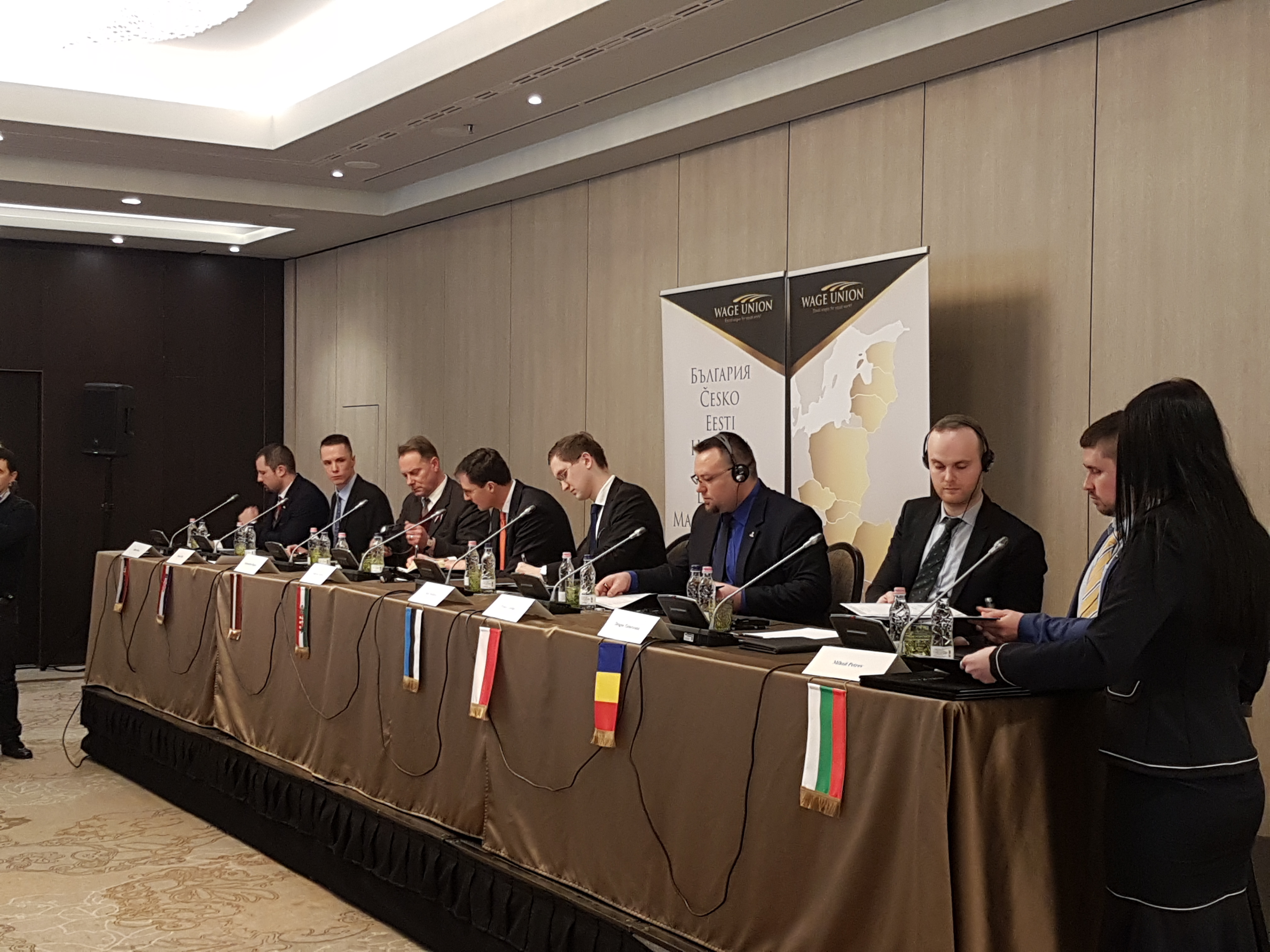By Thibaud Cassel.
European Union – Emmanuel Macron is he man of the ”great leap forward” in terms of European integration. The explicit reluctance of the Visegrád Group is being brushed aside: the reform concerns first the euro zone, and the ones who do not want to follow will remain “in the margins of History”. This is a real break with its hinterland that Germany cannot admit. The Manichean language of the French President might also work against him.
The speech of the French President at the Parliament in Strasbourg on April 17th and his meeting with Angela Merkel in Berlin on April 19th provide us a basis of reflection.
I. Division around the Rhine gold
1. France as supplicant and empress
Germany is today more than ever the centre of gravity of the European Union. Instead of being associated, Germany and France are linked (due to the Monetary Union): for the advantage of the first and for the prejudice of the second. Paradoxically, the French President is as prescriptive as powerless.
The French will of reinforcing the Monetary Union and of establishing a European Monetary Fund (EMF) meets two objectives. The first one is to ensure the solvency of the euro zone in general and of France in particular regarding the vitality of the German economy: ”after the crisis we have introduced instruments in order to reinforce responsibility (…) but we also need solidarity within the Monetary Union” declared the French President on April 19th during his common presentation with the Chancellor. The second objective is a more political one: it consists in strengthening the supra-State, technocratic and financial tutelage on the member countries of the euro zone in order to establish the United States of Europe as whose founding father Emmanuel Macron already imagines himself.
2. The German prudence in two reasons
The German interests are diverging from the French ones. The common currency does reinforce Germany structurally in its role of industrial basin of the euro zone. The German surplus is made by the deficits of its partners. But the enthusiasm of their success hinders the German industrialists to recognise that this hegemony undermines the European stability and is cutting off the branch they are sitting on.
However, this is prudence that prevents the Germans to venture on the slope of post-national Europe. The latter would lure the country out of History as surely as any other European country. The German reunification is not thirty years old and the vitality of the autonomy of the Länders still fosters the national sentiment. Ethnomasochism has indeed become – among others – a German speciality: this obsession is not without hypocrisy and can disguise some very tangible interests.
Between mercantile egoism and political prudence, the German government is not in the situation to give in to Emmanuel Macron’s demands.
II. Why cannot Germany join the ”French ideology”
1. A German Janus in the middle of Europe
But the question is also a geopolitical one and concerns then Central Europe. Germany looks today like a god with two faces: one is turned towards the West, and the other towards the East.
The country has kept from its forty years of FRG (Federal Republic of Germany) a very strong western tropism. An appropriate Atlanticism for joining the family of nations and the Franco-German reconciliation on the basis of the European construction are tangible and long-term elements that structure the German politics.
But with Bavaria, Austria and the former Eastern-Germany, it is almost the half of the German speaking countries that is leaning to the conservative side of the EU. The Danube basin and the Great European Plain gather together 100 millions of Europeans from the Eastern and Central European countries integrated to the EU, and beyond of them the vast horizons of the 21st century promised by the New Silk Road.
Since the Maastricht Treaty adopted in 1992, derogating measures did authorise the companies of the EU to produce in Central Europe without paying any tax for the importation. The German economic policy in Central Europe since almost thirty years can be described as an enormous boost that brought back the German influence into the region, that was traditional since the Middle-Age and was just overshadowed by the USSR from 1945 to 1990.
2. Angela Merkel under pressure by her domestic politics
The populist wave that is sweeping all over Europe increases the audience of the conservative faction of the CDU-CSU, the party of Angela Merkel. As this is indeed from the party of the Chancellor that the strongest reluctance does come against the French project. The Central European neighbourhood has certainly an influence: that German right wing, followed closely by the AfD, is relying without any complex on the shift to the right made by Austria since the new government ÖVP/FPÖ was formed 2017, as well as on the straightforward discourse of the neighbouring Visegrád Group.
But the SPD (German Socialist Party) is not left behind. Its candidate for the chancellery, Martin Schulz, was indeed the declared prophet of the federalisation of the EU, but he had precisely to leave miserably the political scene as he could not obtain the position as Minister of Foreign Affairs that he was coveting. So the SPD is also not a motor for Emmanuel Macron’s federalist efforts on the German side.
III. France’s time to decide
1. To refuse any concession
In the light of the above, one do understand why the meeting in Berlin did not lead to any official announcement, as much as the road map for the reform of the EU is promised for next June. However, the French project is on the table since September 2017… The French side is then restricted to political gestures. Emmanuel Macron invoked “the urgency of the situation” and the “historical moment” in which Europe is standing, in front of an impassive Chancellor. Maybe did she think about the nickname that Viktor Orbán had given to the new French President at his first European Council: the new boy.
Let’s come back to the debate about the future of the EU that took place on the last plenary session of the European Parliament on April 17th. The allocutions of both main speakers during the morning corrected Emmanuel Macron in the same way.
1° The first one is nobody else than Jean-Claude Juncker, President of the Commission. He ensured that Europe would not be limited with France and Germany and that one should endeavour to find solutions with all the 27 members.
2° The second one is the President of the EPP Group in the European Parliament, the German Manfred Weber. He reproached Emmanuel Macron for his Manicheism and ensured that every democratically elected government in the EU was equally worthy and legitimate.
This temperance contrasts with the particular polemic spirit of the French left that sees in the opposition a figure of the evil to be destroyed. Germany does not want to turn away from its hinterland for attending the Cartesian rigour of any “French ideology”.
2. To admit a paradigm shift
The Franco-German condominium over Europe, with quite a liberal and immigrationist software, seems to have been the single European political course developed since one year by the French presidency.
Emmanuel Macron finally congratulated Viktor Orbán for his victory in an almost surprising manner in view of his outrageous rhetoric during his TV interview of Sunday April 15th. This positive approach allows to consider a welcome aggiornamento of Emmanuel Macron’s European policy. Until then, his unlucky words about Poland and the policy of division openly lead against the Visegrád Group represent a meager record regarding Central Europe.
The other region that is still ignored by the French European policy seems to be Latin Europe and particularly Italy. However, the geographic and linguistic proximity, but first of all the common interests in front of the German preponderance make essential such an inter-State cooperation.
This regional entente within the EU is precisely the receipt of the Visegrád Group. The place for this new French European policy to be born might be Italy. This country is a bridge between France and the Visegrád Group, between Latin Europe and the Eastern and Central European countries that are separately subdued to the German preponderance and may negotiate altogether a new European balance.
But might this priority order happen in Emmanuel Macron’s France?
Conclusion: a well balanced tandem in 1990, France and Germany stand today at the time to decide for Europe with a totally different power relationship. Poor sibling of Europe since a long time, Central Europe is today within a phase of structural and sustainable expansion. One cannot say the same about France.
We have analysed it, Germany will not turn away from its so promising Eastern neighbourhood as rebellious as it might be sometimes. France, that imagines itself reforming Europe by its own, might have to suffer from a more continental and less ideological orientation of the continent. Yes, the ideological compatibility is still strong between Germany and France but will it be enough for containing an historical rebalancing working since the fall of the Berlin Wall?
Nobody knows. There is however an indication: for the summit of revival of the European construction of the 27 after the Brexit, the Council of the EU did not choose the Charente of Jean Monnet but the Transylvanian town of Sibiu, 2500 km away. This town is also known under its German name referring to its founder: Hermannstadt, that sends us back to the long centuries of the Middle-Age where the German influence flourished in those regions…




